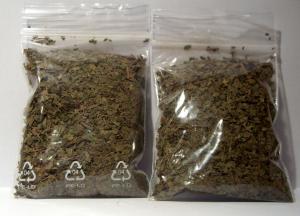Human rights affects drug policy, and the Donald Trump's rhetoric gives human rights defenders much cause for concern.
The DEA got real push-back when it tried to emergency ban kratom. A Florida state legislator is getting some real push-back on her kratom ban efforts, too, and she's not happy about it.
If you need a quick, yet thorough read to get up to speed on weed and where it's headed, we've got a book for you.
The Hemp Industries Association takes on the DEA over its new coding rule for CBDs, state legislators are busily messing with successful medical marijuana initiatives, and more.
It's been a quiet week on the corrupt cops front, but there's still a bit of nefariousness afoot. A Pennsylvania cop gets nailed for ripping off heroin for his own use, and more.
A new study from the Rand Corporation links the introduction of abuse-resistant Oxycontin in 2010 to the rise in heroin overdose deaths, Bolivia and Colombia take different approaches to coca, a Georgian political party office gets raided, and more.
President Obama will commute more drug sentences before he leaves office this week, the hemp industry sues the DEA over its new CBD rule, New York's governor wants to fix his state's decriminalization law, and more.
As his term winds down, President Obama continues to free drug war prisoners, New Jersey Dems plan a legalization bill, Wisconsin Dems plan a medical marijuana bill, and more.
A new report finds illegal weed is a $50 billion business in North America, Denver begins working on its "social use" ordinance, state legislators move to slow the implementation of medical marijuana, and more.
The following statement was distributed this morning by Human Rights Watch. One of the issues it touches on is the Philippines drug war killings and the president-elect's troubling conversation with the mass murderer president of the Philippines. (We are doing work related to the Philippines situation that will be announced in the near future. Human Rights Watch was a key partner in our global drug policy sign-on statement prepared for the 2016 UNGASS.)(Washington, January 20, 2017) -- Donald Trump takes office today having vowed to enact policies that would threaten rights at home and abroad if actually implemented, Human Rights Watch said today. Human rights advocates, elected officials, and members of the public should press the new United States president to abandon those proposals and should call out government actions that violate rights. Congress, the courts, and the people of the United States should demand transparency and hold the administration accountable for policies and actions that threaten rights.
"This inauguration opens up a dangerous and uncertain new era for the United States," said Kenneth Roth, executive director of Human Rights Watch. "Even if President Trump acts only on ten percent of the most problematic of his campaign proposals, it will cause a momentous setback for human rights at home and abroad. The onus is now on elected officials and the public to demand respect for rights that the President-elect seems to have put in his crosshairs."
Both during his presidential campaign and since his election, Trump has embraced policies that would harm the rights of millions of people -- from the immigrants he has vowed to deport in vast numbers, to the women whose reproductive rights he has promised to restrict through his judicial appointments. He has at times publicly embraced torture and the illegal targeted killing of civilians abroad. He said he would halt the release of men from Guantanamo Bay detention facility and "load it up with some bad dudes." Trump's pick for attorney general, Jeff Sessions, has a long track record of hostility and disdain towards the very civil rights enforcement tools the US Justice Department is called on to deploy in defense of rights.
Trump's approach to foreign policy appears to embrace close collaboration with repressive governments on a range of issues, without regard for their troubling human rights records. During his confirmation hearing, Rex Tillerson, Trump's nominee for secretary of state, refused to acknowledge human rights violations by Russia, Saudi Arabia, and the Philippines, despite extensive documentation of the violations by numerous sources, including the US government.
Greatly compounding all of these concerns, there is every reason to worry that the Trump administration will seek to minimize scrutiny of its actions. Trump and his advisers have regularly and very publicly insulted or smeared his critics. Reports indicate his team is considering restricting media access to the White House. And Trump has famously said that he would like to weaken libel laws to facilitate lawsuits against journalists.
"By trampling on the rights of millions of people in the US and abroad, Trump's proposals if enacted would weaken everybody's rights," Roth said. "Elected officials and the public should call out proposals and policies that would weaken rights, and demand a government that protects them."
back to top
This article was produced in collaboration with AlterNet and first appeared here.
Florida state Rep. Kristin Jacobs (D-Coconut Creek) is a woman on a mission, albeit a strange and misinformed one. For the last three years, Jacobs has waged a lonely crusade in Tallahassee to ban kratom, the herb derived from a Southeast Asian tree and widely used for pain relief, withdrawal from opiates, and as a less harmful alternative to opiates.
She's at it again this year, having just introduced a measure,
House Bill 183, that would add mitragynine and hydroxymitragynine, the active constituents of kratom, to the state's controlled substances list. And she's invoking the specter of Hitler as she does so.
Saying the kratom ban was a "fall on the sword issue" for her, Jacobs railed against the people who have opposed her prohibitionist efforts, accusing them of Goebbels-like propaganda.
"They have a story," she told the St. Peters Blog. "Just like Hitler believed if you tell a lie over and over again, it becomes the truth."
Portraying herself as a bravely challenging a "lie machine… a powerful lobby with lots of money," Jacobs warned against "Big Kratom." "It's not just what they're doing here," she said. "They're doing the same thing around the country."
"They" would be the American Kratom Association and the Botanical Education Alliance. The former was founded by Susan Ash, a 46-year-old who began taking kratom while being treated for dependence on prescription pain relievers and now takes a small dose daily to ease chronic pain and depression. She was so impressed with the results, she founded the group in 2015 to represent kratom consumers. The group now has more than 2,000 members and lobbies against efforts to ban the drug.
The latter is a small nonprofit organization "dedicated to educating consumers, lawmakers, law enforcement, and the media aboutstyl safe and therapeutic natural supplements including Mitragyna speciosa, also known as Kratom," the group says on its web page. "Our mission is to increase understanding in order to influence public policy and protect natural supplements. Our vision is to create a society where every adult has the right to access safe and effective natural supplements."
According to the American Kratom Association, "Kratom is not a drug. Kratom is not an opiate. Kratom is not a synthetic substance. Naturally occurring Kratom is a safe herbal supplement that's more akin to tea and coffee than any other substances. Kratom behaves as a partial mu-opioid receptor agonist and is used for pain management, energy, even depression and anxiety that are so common among Americans. Kratom contains no opiates, but it does bind to the same receptor sites in the brain. Chocolate, coffee, exercise and even human breast milk hit these receptor sites in a similar fashion."
Unsurprisingly, Jacobs disagrees. She calls the herb a "scourge on society" and says it "is an opiate," breezily lumping it in with heroin and pain pill mills.
In Jacobs' dystopian vision, she foresees babies born with withdrawal symptoms, emergency room doctors treating strung-out kratom junkies in the throes of withdrawal, and "addicts with glassy eyes and shaky hands" lurking about until the dreaded kratom overdose gets them. "How many more are going to die?" she asks.

Singlehandedly waging a Florida war on kratom: Rep. Kristin Davis (Wikipedia/Creative Commons)
Well, not many, actually. Like opiates, kratom relieves pain, slows bowel activity, produces euphoric feelings, and creates physical addiction and a withdrawal syndrome. But unlike opiates, it causes a pleasant, caffeine-type buzz in small doses and, more significantly, it is apparently very difficult -- if not impossible -- to overdose on it. The few deaths where kratom is implicated include
poly-drug use, or as in a case reported by the
New York Times, suicide by a young kratom user who was also being treated for depression.
"Direct kratom overdoses from the life-threatening respiratory depression that usually occurs with opioid overdoses have not been reported," says Oliver Grundmann, clinical associate professor of medicinal chemistry at the University of Florida, told journalist Maia Szalavitz at Vice. Grundmann should know; he just reviewed the research on kratom for the International Journal of Legal Medicine.
Szalavitz also consulted Mark Swogger, an assistant professor of psychiatry at the University of Rochester Medical Center, who with his colleagues analyzed 161 "experience reports" posted by kratom users on the drug information site Erowid.org for a recent study in the Journal of Psychoactive Drugs.
"I think it's pretty safe to say that kratom has at least some addiction potential. The data is fairly strong on that and our study also found that people are reporting addiction," but "overall, we found that it's really mild compared to opioid addiction and it didn't seem to last as long."
Jacobs' inflammatory and ill-founded comments generated a quick and strong reaction from kratom advocates. Kendra Jowers, who sits on the advisory board of the Botanical Education Alliance, didn't mince any words.
"It's difficult to know how to respond to what Representative Jacobs said, because what she said was borderline lunatic," Jowers told the Florida Report. "And I think any sane, rational person could recognize it as such -- whether they have personal ties to kratom or not," she said.
"When Representative Jacobs feels the need to compare an advocacy organization like the Botanical Education Alliance to the Third Reich, she's already lost the argument. She's already shown that she has no winning hand; that's why she resorts to such absurd and outrageously dishonest appeals to emotion and irrationality. We are a group of professionals from across the country who have volunteered our time to fight for people's right to use a natural supplement to curtail their pain and wean off of addiction to opioids and alcohol. To liken us to Hitler is reprehensible and entirely unprofessional," Jowers continued. "That is not to mention how abhorrent and obscene it was for her to trivialize one of the worst atrocities in human history."

Kratom is often prepared as a tea. (Wikimedia/Creative Commons)
Jowers wasn't done. She also took umbrage at Jacobs' portrayal of kratom users as glassy-eyed addicts.
"She may not have named names, but those were personal attacks. Because when she characterizes kratom users this way -- glassy-eyed, shaking, helpless addicts who aren't competent to understand what they're fighting for here -- she is personally attacking the tens of thousands of Floridians who use kratom to responsibly manage their health conditions," Jowers noted.
"Kratom users are mothers, grandmothers, brothers, sisters, and notably, veterans suffering from PTSD, pain, and addiction that may have resulted from what they've endured in the course of their service to this country. I guarantee, you encounter kratom users all the time, and you would have no idea that they are using it unless they were to tell you -- contrary to Representative Jacobs' histrionic and inaccurate characterization," Jowers added.
The American Kratom Association and the Botanical Education Alliance have led the charge against the DEA's move to federally ban kratom -- a pushback that resulted in the agency's unprecedented decision to delay or possibly even undo the proposed ban. And now they are leading the charge to push back against Rep. Jacobs and her war on the herb.
back to top
Marijuana: A Short History by John Hudak (2016, Brookings Institution Press, 217 pp., $14.95 PB)
Marijuana is going mainstream, as evidenced by the spread of medical marijuana and now outright legalization, not to mention its pervasive and increasingly favorable position in popular culture. In the past 20 years, support for legalization has grown from a distinct minority position to a majority one, and now, after November's elections, more than half the states have approved medical marijuana and nearly one out of six Americans lives in a state where it is legal.
Marijuana is now also big business, with industry watchers estimating the size of the legal market at around $20 billion by 2020. There's one problem with such rosy scenarios, though: Pot remains illegal under federal law.
That's a big problem for John Hudak, a senior fellow in governance studies at the Brookings Institution with a keen professional interest in public policy implementation, legislative-executive relations, and marijuana policy. In Marijuana: A Short History, Hudak takes marijuana legalization as pretty much a given -- provided it isn't screwed up too badly in implementation -- and sees federal marijuana prohibition largely as an obstacle to getting pot policy right.
He sketches out the strange place we now find ourselves, with a booming industry enriching state tax coffers at the same time it remains federally illegal, and a federal government largely turning a blind eye to the violations of federal law -- at least for now -- while at the same time refusing to allow that industry the banking privileges and tax breaks provided to legal businesses. Meanwhile, marijuana sellers become Chamber of Commerce members in some states and prison inmates in others.
Hudak describes the growing tension between legalization in the states and federal prohibition as challenging federal authority while also hampering the efficient functioning of the marijuana industry. In his view, we're now in a sort of "worst of both worlds" status quo:
"The resulting situation in the United States may be worse than either national legalization or national prohibition. Legal realities are loosely defined by executive branch guidance and suggestions from the administration. This guidance fails to answer important questions and oftentimes creates new ones. States are constantly asking the federal government how to deal with many of the problems they face; the answers are almost always insufficient. Members of Congress have proposed solutions to some of the biggest challenges facing states, industry actors, and consumers, but that legislation is not acted on."
"The reality is that the state of American law at the start of 2016 is absolutely untenable and is inconsistent with American principles of fairness and equal treatment. Federal officials must commit themselves to coherent, comprehensive, and sensible marijuana policy. Until they do, the system will be arbitrary and unjust, and policy will be ineffective."
Now, at the start of 2017, the tensions Hudak highlights are even more acute, and the November elections brought them to the fore. At the same time the legal recreational market quintupled in size with victories in California, Maine, Massachusetts, and Nevada, the nation elected Donald Trump, whose attorney general pick, Alabama Sen. Jeff Sessions, is an avowed foe of legalization and drug law reform in general.
Trump himself has said he favors letting the states experiment, but the billion-dollar question is whether Trump is going to set pot policy or leave it to his minions. If it's the latter, legal marijuana may be in for a bumpy ride, but even if it's the latter, that's just the political status quo.
That isn't enough for Hudak. He wants things settled at the federal level through congressional action, not left to the administrative whim of some officeholder. Whether the next few years is going to bring us any closer to Hudak's prescription for pot policy perfection is an open question, and it's sure to be contested political terrain.
Hudak raises the right questions about marijuana's future, but make no mistake, Marijuana: A Short History is by no mean all wonkery. After all, Hudak is writing a history, and he does just that in a concise and lively manner, concentrating on the 20th Century in the US, a period that saw the long arc of marijuana prohibition peak before the decline it now faces in the early years of the 21st Century. Of special interest is his section on the rise of a successfully reform movement, as he zeroes in on the people and strategies that made it happen.
Okay, Marijuana: A Short History is pretty wonky. It's serious stuff with a serious purpose: getting us down the path to a sane and effective marijuana policy nationwide. People with an interest in marijuana and marijuana legalization need to be thinking about these things, and Hudak is going to reward a serious reader. And he isn't going to make you slog through 400 pages of academic prose along the way. Read it; it'll make you think.
back to top
The Hemp Industries Association takes on the DEA over its new coding rule for CBDs, state legislators are busily messing with successful medical marijuana initiatives, and more.
NationalLast Friday, the HIA sued the DEA over CBD. The Hemp Industries Association filed a judicial review action against the DEA last Friday over the agency's new rule establishing coding for marijuana derivatives such as CBD cannabis oil. The DEA overstepped its bounds and put at risk a booming cannabis and hemp industry, the suit alleges.
Arkansas
Arkansas House Approves Medical Marijuana Delay. The House voted Tuesday to approve a proposal that would delay implementation of the state's new medical marijuana law. The measure is House Bill 1026. The bill bumps back a 120-deadline from Election Day for the state to issue dispensary and cultivation licenses to 180 days.
Florida
Florida Regulators Issue Draft Medical Marijuana Rules; Initiative Backers Cry Foul. On Tuesday, regulators issued draft medical marijuana rules that had initiative sponsors crying foul. State health officials released draft rules for the state's voter-approved medical marijuana program, but that draft largely leaves current vendors with a stranglehold on the state's industry by applying current laws to the constitutional amendment approved in November, and that isn't sitting well with the people who sponsored the Amendment 2 initiative. "The rule is basically ignoring the text of the constitutional amendment at almost every point of the way," said Ben Pollara, campaign manager of the political committee backing the amendment. The health department will hold public hearings to take input on the rule during the second week of February, with meetings in Jacksonville, Fort Lauderdale, Tampa, Orlando and Tallahassee.
Georgia
Georgia House Forms Medical Marijuana Study Committee. House Speaker David Ralson (R-Blue Ridge) announced Wednesday that a medical marijuana study committee had been formed with Rep. Allen Peake (R-Macon) as its chair. Peake is the author of the state's current limited medical marijuana law and has already announced plans for legislation this year.
North Dakota
North Dakota Senate Approves Medical Marijuana Delay Bill. The state Senate voted 45-0 Tuesday to approve Senate Bill 2154, which would delay some provisions of the state's voter-approved medical marijuana law. Senate leaders said the delay is necessary to develop rules and regulations for the program. The bill now goes to the House.
Wisconsin
As of Monday, Democrats were working on a medical marijuana bill. State Sen. Jon Erpenbach (D) and Rep. Chris Taylor (D) are circulating a medical marijuana after Republican Assembly Speak Robin Vos said he would be open to the idea. Republicans control both houses of the state legislature, and Senate Majority Leader Scott Fitzgerald is not in favor. The Democratic pair have until January 26 to come up with cosponsors and file the bill.
[For extensive information about the medical marijuana debate, presented in a neutral format, visit MedicalMarijuana.ProCon.org.]
back to top
It's been a quiet week on the corrupt cops front, but there's still a bit of nefariousness afoot. A Pennsylvania cop gets nailed for ripping off heroin for his own use, and more. Let's get to it:
In Donora, Pennsylvania, a part-time Donora police officer was arrested last Tuesday for stealing 133 bags of heroin that had been seized as evidence during a search. Officer James B. Johnson, 29, has allegedly confessed to taking the heroin from the evidence room, saying he intended it for his own personal use. He is charged with several drug offenses, theft, obstruction, tampering and misapplication of entrusted property.In Baltimore, a Baltimore police officer was convicted last Thursday of tipping off suspected drug dealers. Officer Stacy Plater went down after FBI agents showed photos of suspects at a roll call, knowing that Plater knew one of them. Plater took the bait, asking if he could keep the photo, and then calling the drug dealer with a heads up. He was convicted on an official count of misconduct by a jury and faces a February sentencing date.
back to top
A new study from the Rand Corporation links the introduction of abuse-resistant Oxycontin in 2010 to the rise in heroin overdose deaths, Bolivia and Colombia take different approaches to coca, a Georgian political party office gets raided, and more.

Georgian police seized pot plants in paper cups from the Girchi Party offices in Tbilisi Wednesday. (DF News)
New Mexico Legalization Bill Filed. State Rep. Bill McCamley (D-Las Cruces) has filed House Bill 89, the Cannabis Revenue and Freedom Act. It would allow the possession of up to two ounces by adults at home and one ounce outside the household, the cultivation of up to six plants (or 12 per household) and the possession of a harvest up to eight ounces. The measure would revamp the state's existing medical marijuana system and allow for marijuana sales beginning in 2019.
Medical Marijuana
Georgia House Forms Medical Marijuana Study Committee. House Speaker David Ralson (R-Blue Ridge) announced Wednesday that a medical marijuana study committee had been formed with Rep. Allen Peake (R-Macon) as its chair. Peake is the author of the state's current limited medical marijuana law and has already announced plans for legislation this year.
Heroin and Prescription Opioids
RAND: Introduction of Abuse-Deterrent Oxycontin Led to Rise in Heroin Overdose Deaths. In a new working paper released this week, the RAND Corporation looked at supply-side attempts to limit access to opioids and found unintended consequences. Focusing on the 2010 introduction of abuse-resistant Oxycontin, the RAND analysts found "large differential increases in heroin deaths immediately after reformulation in states with the highest initial rates of OxyContin misuse" and concluded that "a substantial share of the dramatic increase in heroin deaths since 2010 can be attributed to the reformulation of OxyContin."
Asset Forfeiture
North Dakota Civil Asset Forfeiture Reform Bill Filed. Eight state legislators jointly filed House Bill 1170 last week. The bill would prohibit the seizure of property without a criminal conviction in most cases. The measure would also require that most proceeds from forfeitures go into the state's general fund; currently, law enforcement agencies can keep up to 100% of the proceeds. The bill would also ban passing busts off to the feds in a bid to evade state restrictions.
International
Bolivia Government Files Bill to Expand Coca Production. The bill would expand legal coca production from 30,000 acres to 50,000 acres. But not all coca growers are happy because some regions are getting more expansion than others.
Colombia Starts Spraying Glyphosate on Coca Crops Again. Colombia recommenced the controversial program on January 2, but this time, it's not using airplanes. Instead, the spraying is being conducted by hand. The aerial spraying campaign had been ended in 2015 over health and environmental concerns, but faced with an increasing amount of coca under cultivation, the government is now resorting once more to the herbicide.
Republic of Georgia Police Raid Party Office, Seize Pot Plants. Georgian police raided the office of the Girchi Party Wednesday, seizing 84 marijuana seedlings that had been planted New Year's Day in a bid to gain publicity for drug decriminalization. Police had threatened party activists with up to 12 years in prison for drug cultivation, but so far have only seized the plants. "This is the price of the action, that something like this would have consequences. Let's see what level this absurdity will reach. I worry about the plants. I am not sure if they will take proper care on them," Iago Khvichia, a member of the party's political council said.
back to top
President Obama will commute more drug sentences before he leaves office this week, the hemp industry sues the DEA over its new CBD rule, New York's governor wants to fix his state's decriminalization law, and more.

Obama is about to free hundreds more nonviolent drug offenders. (whitehouse.gov)
New York Governor to Propose Clarifications to State's Decriminalization Law. Gov. Andrew Cuomo (D) has announced plans to remove a loophole in the state's decades-old decriminalization law that lets police charge people with a criminal offense for possession in "public view." That loophole has been applied mainly against racial minorities. Governor Cuomo pushed heavily for closing that loophole in 2014 but was blocked by Senate Republicans who opposed a measure that would have standardized the penalty for all low-level possession as a violation, which would have resulted in a fine instead of arrest.
Medical Marijuana
HIA Sues DEA Over CBD. The Hemp Industries Association filed a judicial review action against the DEA last Friday over the agency's new rule establishing coding for marijuana derivatives such as CBD cannabis oil. The DEA overstepped its bounds and put at risk a booming cannabis and hemp industry, the suit alleges.
North Dakota Bill Would Delay Medical Marijuana Implementation. State Senate Majority Leader Rich Wardner (R-Dickinson) has introduced a bill, Senate Bill 2154, that would suspend implementation of parts of the state's new voter-approved medical marijuana law until the legislature could write a comprehensive law to govern medical marijuana in the state.
Sentencing
Obama Set to Commute Sentences for Hundreds More This Week. As the clock ticks down on his term, President Obama is set to keep on granting clemency to drug offenders up until the last minute. Justice Department officials say he will grant hundreds more commutations this week. He has already cut the sentences of more than 1,100 nonviolent drug offenders, more than any president in modern history.
back to top
As his term winds down, President Obama continues to free more drug prisoners; New Jersey Dems plan a legalization bill, Wisconsin Dems plan a medical marijuana bill, and more.

Obama meets with prisoners at the El Reno, Oklahoma, federal detention facility. (whitehouse.gov)
New York Times Editorial Board Calls on Feds to Remove Barriers to Marijuana Research. In a Tuesday editorial, the Times cited last week's report from the National Academy of Sciences as it called on the federal government to reschedule marijuana out of Schedule I or, at least, remove regulatory barriers to further research on it. Marijuana "does not belong with LSD and heroin on Schedule I," the Times declared, but "even if Mr. Trump and Congress are unwilling to reclassify marijuana, they could remove the regulatory barriers to research and let scientists get to work."
New Jersey Democrats Prepare Legalization Bill, Despite Christie's Opposition. State Sen. Nicholas Scutari (D) said Monday that he and other Democrats will introduced a legalization bill in February, despite the opposition of Gov. Chris Christie (R). But Christie will be gone after the next election, and the legalization bill will still be there.
Medical Marijuana
Wisconsin Democrats to File Medical Marijuana Bill. State Sen. Jon Erpenbach (D) and Rep. Chris Taylor (D) are circulating a medical marijuana after Republican Assembly Speak Robin Vos said he would be open to the idea. Republicans control both houses of the state legislature, and Senate Majority Leader Scott Fitzgerald is not in favor. The Democratic pair have until January 26 to come up with cosponsors and file the bill.
Sentencing
Obama Commutes Sentences for Another 200+ Drug Offenders, and Chelsea Manning, Too. President Obama Tuesday announced he has commuted the sentences of 209 federal prisoners, nearly all drug offenders, as well as imprisoned leaker Chelsea Manning. Tuesday's actions bring to 1,385 the number of sentences commuted under Obama, far exceeding the number of commutations granted by any modern president.
International
Iran Hangs 14 More Drug Prisoners. At least 14 people were hanged at Karaj Central Prison on drug-related charges in the past week, Iran Human Rights reported Tuesday. The group named 10 of the executed: Mohammad Soleimani, Ali Ebadi, Ali Reza Moradi, Majid Badarloo, Omid Garshasebi, Ali Yousefi, Seyed Ali Sorouri, Ebrahim Jafari, Ali Mohammad Lorestani, and Mohsen Jelokhani. The continuing executions come even as the Iranian parliament considers ending the death penalty for drug offenses.
Brazil Approves First Marijuana-Based Medicine. Brazil's National Health Surveillance Agency (Anvisa)has issued a license for Metavyl, a drug containing 27 milligrams of THC and 25 milligrams of CBD per milliliter. The drug will be available as an oral spray. But Anvisa has designated Metavyl a "black label" drug, meaning it can only be used by patients who have not responded to conventional medicines.
back to top
A new report finds illegal weed is a $50 billion business in North America, Denver begins working on its "social use" ordinance, state legislators move to slow the implementation of medical marijuana, and more.
Marijuana PolicyEstimate Puts Size of North American Pot Market at More Than $50 Billion. A new report from the Arcview Market Research group puts the size of the North American legal marijuana market at $6.9 billion, which is overwhelmed by the $46.4 billion dollar illicit market. Black market marijuana is bigger than wine, which comes in at $38 billion.
States' Effort to Undo Colorado Pot Law Revived. A panel of judges from the 10th US Circuit Court of Appeals in Denver heard arguments Tuesday in a case brought by the states of Nebraska and Oklahoma against Colorado's marijuana law. The hearing suggested judges were open to considering RICO charges against dispensary operators and marijuana cultivation operations. Any decision on the case could take months.
Nevada Governor Announces 10% Excise Tax on Recreational Marijuana. In his final budget speech, Gov. Brian Sandoval (R) announced a 10% excise tax on pot to help support his new budget, which is up 10% from last year's. There's already a 15% is already in place for wholesale purchases, and dispensary operators worry that additional taxes could make the black market stronger.
Denver Begins Work on Allowing Pot Use in Clubs, Other Businesses. A working group of Denver business owners, city regulators, and marijuana foes met together Wednesday to begin crafting regulations to implement the city's voter-approved "social use" ordinance, which will allow clubs, coffee shops, yoga studios, and other businesses to allow marijuana consumption on premises. There is no deadline for finalizing the rules, but advocates hope the city will start accepting applications by the summer.
Medical Marijuana
Arkansas House Approves Medical Marijuana Delay. The House voted Tuesday to approve a proposal that would delay implementation of the state's new medical marijuana law. The measure is House Bill 1026. The bill bumps back a 120-deadline from Election Day for the state to issue dispensary and cultivation licenses to 180 days.
Florida Regulators Issue Draft Medical Marijuana Rules; Initiative Backers Cry Foul. State health officials released draft rules Tuesday for the state's voter-approved medical marijuana program, but that draft largely leaves current vendors with a stranglehold on the state's industry by applying current laws to the constitutional amendment approved in November, and that isn't sitting well with the people who sponsored the Amendment 2 initiative. "The rule is basically ignoring the text of the constitutional amendment at almost every point of the way," said Ben Pollara, campaign manager of the political committee backing the amendment. The health department will hold public hearings to take input on the rule during the second week of February, with meetings in Jacksonville, Fort Lauderdale, Tampa, Orlando and Tallahassee.
North Dakota Senate Approves Medical Marijuana Delay Bill. The state Senate voted 45-0 Tuesday to approve Senate Bill 2154, which would delay some provisions of the state's voter-approved medical marijuana law. Senate leaders said the delay is necessary to develop rules and regulations for the program. The bill now goes to the House.
Law Enforcement
LEAP Changes Its Name, But Not Its Acronym. The drug reform police group Law Enforcement Against Prohibition (LEAP) has now changed its name to the Law Enforcement Action Partnership. "For more than a year, our board and staff have been hard at work to expand into the broader field of criminal justice reform while maintaining a keen focus on our drug policy work. Not only will this expanded scope be a natural fit for our speakers' criminal justice expertise, but it will also help us to become even more effective at moving the drug policy reform conversation forward. And, when you care about something, you want it to be the best it can be. With the right criminal justice reforms, we can do better, for ourselves and for our communities. Our new name reflects the core of our organization," the group said.
New Mexico Bill Would Expand DUI to Include Drugs. Rep. William Rehm (R-Albuquerque) has filed a bill that would target "drugged driving" by setting blood concentration levels similar to those for alcohol for five drugs: marijuana, cocaine, heroin, amphetamine, and methamphetamine. The measure is House Bill 22. But the Drug Policy Alliance, which has opposed similar bills in the past, is raising concerns about this one as well, saying it puts tens of thousands of medical marijuana patients at risk of arrest by setting THC limits unsupported by scientific research.
back to top










